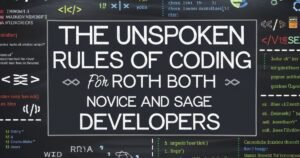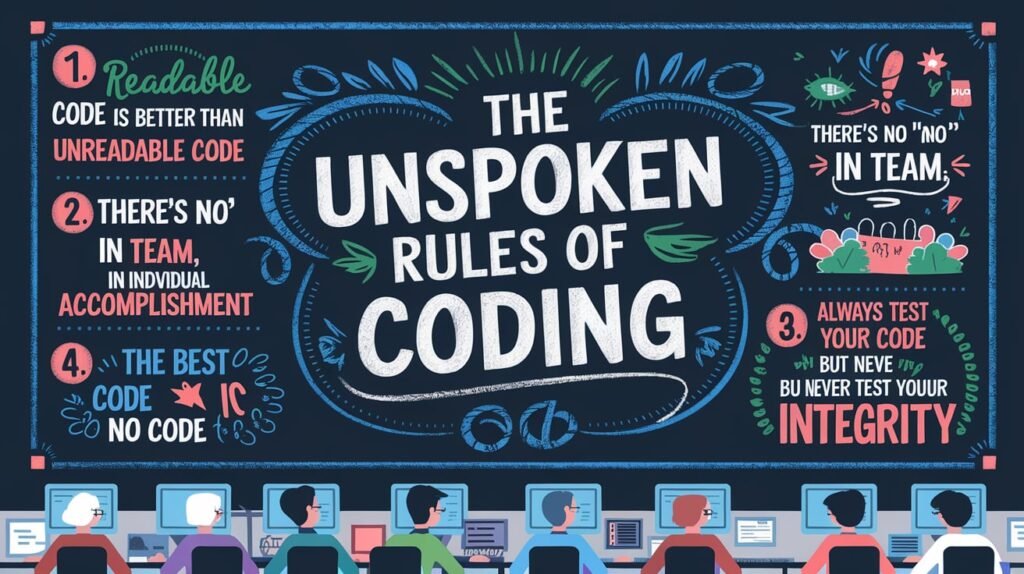Understanding the Foundation: Best Practices for Novice Developers
For novice developers, building a solid foundation in programming is crucial to achieving long-term success. One of the primary unspoken rules of coding is the importance of writing clean code. Clean code is not only easier to read and understand, but it also reduces the likelihood of bugs and makes maintenance more manageable. By maintaining clarity in their coding style, novice developers can ensure that their code is accessible to both themselves and others who may work on it in the future.
Another important aspect to consider is the use of comments within the code. Comments serve as a guide for any future developers who may read the code, providing context and explanations for complex sections. Therefore, incorporating meaningful comments can significantly enhance the readability and maintainability of a project. Novices should practice commenting their code as it fosters good habits and can greatly aid their understanding of how their code functions over time.
Moreover, understanding version control is fundamental for any developer, regardless of their experience level. Version control systems, such as Git, allow developers to track changes, collaborate with others, and revert to previous file versions when necessary. For newcomers, familiarizing themselves with version control practices is crucial, as it instills discipline and supports better project management.
Adhering to coding standards is yet another unspoken rule that novice developers should take seriously. Established methodologies and coding conventions provide a roadmap for writing quality code. When beginners commit to these standards, they not only improve their coding skills but also contribute positively to team projects. Overall, taking the time to learn these best practices lays a strong foundation, paving the way for a successful coding journey.
Advanced Techniques: Wisdom from Sage Developers
As developers progress in their careers, they often encounter advanced techniques that not only enhance their coding skills but also improve the overall efficiency of their development processes. One significant area that sage developers focus on is code optimization. This involves refining existing code to improve performance, readability, and resource management. Utilizing algorithms and data structures effectively allows developers to write code that runs faster and requires less memory. Novice developers can benefit from studying optimization strategies, understanding that well-structured code is key to scalable applications.
Additionally, the adoption of design patterns is a critical aspect of advanced coding techniques. These patterns are proven solutions to common problems encountered during software development. By familiarizing themselves with these patterns, developers can create more maintainable and reusable code, reducing redundancy and fostering collaborative efforts within teams. Whether it’s the Singleton, Factory, or Observer patterns, a sage developer can navigate through these concepts to craft elegant solutions to complex problems.
The importance of mentorship cannot be overstated in the realm of coding. Sage developers often take on mentoring roles, guiding novices through their journeys. This relationship not only helps novices gain valuable insights but also reinforces foundational principles for sage developers. By sharing experiences and strategies, both parties benefit from a richer understanding of the coding discipline. Moreover, continuous education plays a pivotal role in a developer’s career longevity. Staying updated with the latest technologies and methodologies is crucial; sage developers often engage in workshops, read industry literature, and participate in coding communities.
Ultimately, the unspoken rules of coding encompass a variety of advanced techniques that foster growth at any level. By recognizing the value in code optimization, design patterns, mentorship, and lifelong learning, both novice and sage developers can cultivate their skills and contributions to the field of software development.
Collaboration and Communication: Bridging the Gap Between Experience Levels
In the dynamic landscape of software development, effective collaboration and communication between novice and sage developers play a pivotal role in creating a robust coding culture. The coding environment thrives on diverse perspectives and knowledge sharing, where each team member’s experience contributes to an enriched learning atmosphere. One effective method for bridging the experience gap is through code reviews. Novice developers can gain invaluable insights from sage developers, while experienced coders can benefit from fresh perspectives that help them reassess their approaches to problem-solving. This dual learning process fosters mutual respect and enhances overall coding quality.
Pair programming also serves as an excellent platform for collaboration. In this practice, two developers work together at a single workstation, which encourages real-time feedback and knowledge exchange. While a sage developer may take on the role of the “driver,” writing code, the novice acts as the “observer,” providing input and asking questions. This interaction not only demystifies complex coding concepts but also builds confidence in newer developers as they glean practical wisdom from their more experienced colleagues.

However, barriers to effective communication often arise, such as differences in terminology and varying levels of comfort with technology. To promote understanding among team members, it is essential to foster an environment of open dialogue, where questions are encouraged regardless of the asker’s experience level. Regular team meetings can also create an inclusive space for discussing challenges and sharing success stories, thereby reinforcing a sense of camaraderie within the coding team.
Ultimately, embracing a culture of collaboration and communication strengthens the coding community. As both novice and sage developers engage in knowledge sharing, they collectively navigate the unspoken rules of coding, leading to the development of more comprehensive, innovative solutions and fostering professional growth for all involved.
Staying Current: The Continuous Evolution of Coding Standards
In the fast-paced world of technology, coding standards are not static; they evolve continuously. This evolution is driven by advancements in technology, shifting industry standards, and emerging best practices. Both novice and sage developers must acknowledge this dynamic landscape and embrace the need to remain current. By cultivating a growth mindset, developers can more effectively adapt to the unspoken rules of coding and thrive in their careers.
One key strategy for staying current is to invest in professional development. This can include participating in workshops, online courses, and coding boot camps that focus on the latest technologies and methodologies. Many resources, such as online learning platforms like Coursera, Udemy, or LinkedIn Learning, offer specialized courses tailored to specific programming languages or frameworks. These resources enable developers to not only learn new skills but also to reinforce their existing knowledge with contemporary practices.
Networking with other professionals is another vital aspect of keeping up-to-date with coding standards. Engaging in local tech meetups, conferences, and online forums can provide valuable insights into industry trends and practices. Participating in discussions with fellow developers allows individuals to share experiences, challenges, and solutions, fostering a community of continuous learning. As industry trends shift, developers must also be proactive in seeking new knowledge through blogs, podcasts, and webinars that focus on coding advancements.
Additionally, developing a habit of reading documentation and following updates from programming communities can significantly aid in staying informed. By subscribing to newsletters or following relevant social media channels, developers can receive the latest information on best practices, coding standards, and emerging technologies. Adopting a proactive approach towards learning and professional growth is essential for both novice and sage developers to navigate the complexities of an ever-evolving coding landscape.
